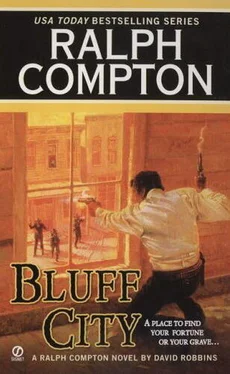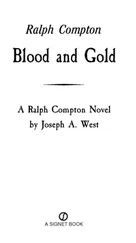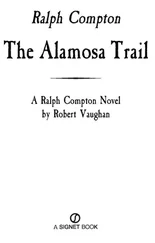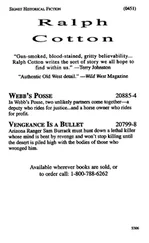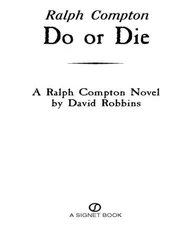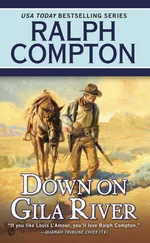Clay stood in the open flap and raked those inside with a look that caused those who noticed him to stiffen and nudge their companions. He figured the four would be there spending his money and he was right. He shouldered past several men and one opened his mouth to object, but after a glance at Clay he changed his mind.
The four had a table to themselves. Each had a whiskey bottle. They were talking and smiling and Charlie was dealing.
Clay stopped and waited for them to notice him. His thumbs were hooked in his gun belt, his right hand near his Colt. His hat brim was low over his eyes.
The Samaritan was the observant one. About to take a swig, he crooked his head and said, “Care to sit in, mister?”
“No.”
“Something we can do for you then?”
“You can die,” Clay said.
That got their attention. They stopped drinking and playing and looked at him. Charlie’s eyebrows met over his nose and he said, “Why did you go and say a thing like that?”
“You step on toes, you get kicked.”
“What the hell?” Charlie said. “We’d never tangle with the likes of you. It’s as plain as the nose on your face that you’re a gunny.”
“You thought it was healthy when you took my poke.”
Charlie started, and the Samaritan swore, and one of the others nearly dropped his whiskey bottle.
“I came for my poke, and however much of my money you haven’t spent,” Clay said.
“It can’t be!” Charlie blurted.
“But first there’s the other thing,” Clay said. “Sitting down or standing up, it makes no difference to me but it might to you, so you can stand if you want.”
“All four of us?” the Samaritan said. “No one is that good. Not even Hickok.”
“How would you know?” Clay rejoined. “You ever meet him? You ever see him shoot?” He lowered his arms.
Word was spreading and men were backing to the bar or the other side of the tent. The bartender said, “This is no place for a lady. What are you doing here?”
“Never you mind,” Melanie replied.
Clay did not take his eyes off the four. “Don’t take all day making up your minds. I have somewhere to be.”
Charlie was the smart one. He stalled. “Can’t we make this right? We’ll pay back your money and extra besides.” He spread his hands on the table. “How were we to know? In that suit and that silly hat, how were we to know?”
“I’ll count to three,” Clay said. “You can sit there or you can slap leather. It’s all the same to me.” He paused. “One.”
With an inarticulate cry, the Samaritan heaved up out of his chair, his revolver sweeping from under his belt.
Clay drew and put a slug into the Samaritan’s chest, then pivoted and put another into the man on the left, and fanned his pearl-handled Colt and the third man’s face erupted in a spray of scarlet. That left Charlie, who had his six-shooter out and was smiling because he thought he had Clay beat. Charlie died with that smile on his face and a bullet hole between his eyes.
The saloon was deathly still until someone exclaimed, “Dear God in heaven!”
Clay reloaded, twirled the pearl-handled Colt into his holster, and collected his poke and his one hundred and four dollars. He did not take the rest of their money. All eyes were on him as he walked out.
Melanie said as he passed her, “You enjoyed that, didn’t you?”
“I know I did,” Mr. Train said.
Chapter 22
The remote vastness of the Rockies. Mile after unending mile of upthrust slopes, steep and severe, in places covered with treacherous talus or impassable deadfalls. Mile after mile of dense timber. Man rarely penetrated this far. Even the Indians only came on occasion, usually to hunt elk or mountain sheep, or to collect eagle feathers.
Crowned by the Continental Divide, the higher reaches of the mountains were the last bastion of unexplored land on the continent. There were no Indian villages, no towns, no cities. There were no roads or trails except game trails; but there was plenty of game. Here dwelled the majestic elk, giant grizzlies, fierce wolverines. Here roamed the big cats, the lions named after the high country they roamed.
For Clay Adams, Melanie Stanley and Mr. Train, the next phase of their search took them into the heart of the unknown. On foot they could not have done it. The terrain was too harsh, the strain on human muscle and stamina too relentless. Only on horseback could the upper reaches of the mountains be traversed, and even then it taxed them and their mounts to their limits. They were fortunate in that the weather had briefly warmed. Indian summer, some called it.
Four days of it, four days of pushing themselves minute by minute and hour by hour, and the three of them and their horses were close to exhaustion. Their nightly rest was not enough. They were always tired, and tired people and tired animals were prone to mistakes. So they had to go slower than they might otherwise, and always, always, watch that their horses did not suffer a misstep, for without their horses they would be at the mercy of the relentlessly cruel mistress known as Nature.
The morning of the fifth day found them camped beside a turquoise lake half a mile below a snowcapped peak. A waterfall fed the lake, its spray rising in a fine mist in rainbow hues.
Clay had not changed back to his store-bought clothes. He enjoyed being able to wear his old clothes again, and to openly wear his Colt.
They were about finished breakfast when Mr. Train said, “If what I was told is true, the Stark gang is holed up in a canyon south of here. I will go alone to scout around. The two of you stay with the horses and rest up.”
“I’ll go with you,” Clay offered.
“They are bound to have a lookout, and one man is less conspicuous than two.” Train rose and cradled his rifle. “If I am not back by noon you can come looking.”
“Whatever you want.” Clay had grown to like the manhunter, especially since Train had the decency not to badger him with questions after the incident at Calamity.
Melanie had not spoken much since. But no sooner were they alone than she looked up and said, “I owe you an apology.”
“I must have missed something,” Clay said.
“I’ve been mad at you. Those men in the tent. I didn’t think it was necessary. I still don’t.”
“Then what are you apologizing for?”
“Mr. Train thinks I was being too hard on you. He said those men were almost as bad as Jesse Stark. That they deserved what they got.”
“No one is as bad as Jesse Stark.”
“Quit quibbling. I’m trying to do the right thing. The least you can do is be gracious.”
Clay smiled.
Suddenly serious, Melanie said, “Can I ask you a question?”
“You may ask me anything, anytime. If that’s not gracious I don’t know what is,” was Clay’s riposte.
“It is about us. Or is there an us? We haven’t talked about it, but I have made my feelings clear and I would like to know where I stand when we get back.”
Clay came over to her and took her hand. “By my side, I hope.”
“I’m not trying to back you into a corner,” Melanie said. “Don’t make promises you can’t keep. A woman just needs to know. I do, anyway. And the suspense is killing me.”
“We were friends when we left Bluff City but we are more than friends now,” Clay said.
“What are we exactly? As my uncle would say, what are your intentions, young man? When you say ‘by your side,’ do you mean temporary or permanent? Because I don’t do temporary.”
“Neither do I.”
Melanie smiled and threw her arms around him and kissed him on the neck. “Thank you. What we did was more than I have ever done and I have felt guilty. Now I don’t need to.”
Читать дальше
